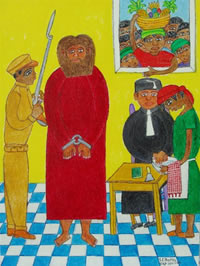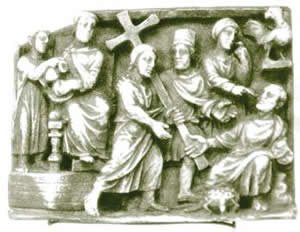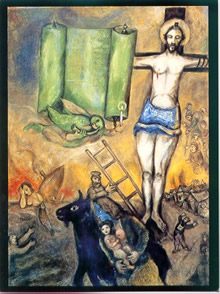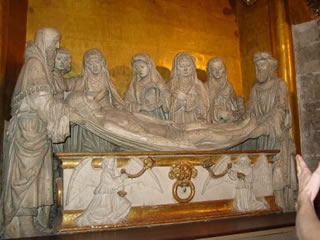He's Subverting Our Nation!
Palm Sunday
For Sunday April 1, 2007
Sixth Sunday in Lent
Lectionary Readings (Revised Common Lectionary, Year C)
Isaiah 50:4–9a
Psalm 31:9–16
Philippians 2:5–11
Luke 22:14–23:56 or 23:1–49
Macedonian icon of Jesus's Triumphal Entry (13th century). |
Palm Sunday triggered the beginning of the end for Jesus.
What began on Sunday with a religious procession ended Friday morning with a public display of state terror. Excited children waving palm branches were quickly forgotten when violent mobs shouted death chants. By Good Friday, Jesus's disciples argued among themselves about who was the greatest, Judas betrayed him, Peter denied knowing him, all his disciples fled (except for the women), and Rome employed all the brutal means at its disposal to crush an insurgent movement—rendition, interrogation, torture, mockery, humiliation, and then a sadistic execution designed as a "calculated social deterrent" (Borg) to any other trouble makers who might challenge imperial authority.
But just why did Jesus die? At least one answer emerges when you connect three data points from his birth, his public debut, and then his death on Good Friday.
To back track to his nativity, in her Magnificat Mary proclaimed that with the birth of her son God would "bring down rulers from their thrones, fill the hungry with good things, and send the rich away empty" (Luke 1:52–53). The aged Simeon uttered a dark prophecy to the young mother: "This child is destined to cause the falling and rising of many in Israel, and to be a sign that will be spoken against" (Luke 2:34).
 |
Jesus before Pilate, Seymour E. Bottex, Haiti. |
After his birth, Jesus vanished into historical obscurity, then thirty years later burst onto the scene with the provocative declaration, "Repent! The kingdom of God is at hand" (Mark 1:15). There's a new rule and a new reign, he said. Mary's song about toppling political and economic powers and Jesus's inauguration of an alternate social vision set him on a collision course with Rome. After three years of itinerant preaching, teaching, and healing that focused on the poor, the imprisoned, the blind, and all who were oppressed (Luke 4:18ff), his family declared him insane and the authorities finally had enough.
The passion narratives for this week explain why. Jesus was executed for three reasons, says Luke: "We found this fellow subverting the nation, opposing payment of taxes to Caesar, and saying that He Himself is Christ, a King" (Luke 23:1–2). In John's gospel the angry mob warned Pilate, "If you let this man go, you are no friend of Caesar. Anyone who claims to be a king opposes Caesar" (John 19:12).
So why did Jesus die? "He's subverting our nation. He opposes Caesar. You can't befriend both Jesus and Caesar."
 |
The Condemnation of Christ and the Denial of Saint Peter, early fifth century, British Museum. |
Jesus's triumphal entry into the clogged streets of Jerusalem on Good Friday was thus a highly symbolic and provocative act, an enacted parable, or street theater that dramatized his subversive mission. He didn't ride a donkey because he was too tired to walk or because he wanted a good view of the crowds. The Oxford scholar George Caird once characterized Jesus's triumphal entry as more of a "planned political demonstration" than the religious celebration that we sentimentalize today.
Given that the Roman state always made a show of force during the Jewish Passover when pilgrims thronged to Jerusalem to celebrate their political liberation from Egypt centuries earlier, Borg and Crossan imagine not one but two political processions entering Jerusalem that Friday morning in the spring of AD 30. In a blatant parody of imperial politics, king Jesus descended the Mount of Olives into Jerusalem from the east in fulfillment of Zechariah's ancient prophecy: "Look, your king is coming to you, gentle and riding on a donkey, on a colt, the foal of a donkey" (Matthew 21:5 = Zechariah 9:9). From the west, the Roman governor Pilate entered Jerusalem with all the pomp of state power. Pilate's brigades showcased Rome's military might, power and glory. Jesus's triumphal entry, by stark contrast, was an anti-imperial and anti-triumphal "counter-procession" of peasants that proclaimed an alternate and subversive social vision called "the kingdom of God."
People today argue about who's "subverting our nation." A friend in Florida forwarded me an email that blamed Muslims in America for our problems. Others attack evangelicals as "Christian fascists." For a long time now others have taken aim at "secular humanists" and liberal Democrats. On his nationally televised program Jerry Falwell blamed the wickedness of pagans, abortionists, feminists, gays, lesbians, the ACLU, and People for the American Way for the 9-11 disaster, which he construed as God's judgment. Pat Robertson, a guest on the show, nodded in agreement, “well, I totally concur.” The greed of corporate executives and the sleaze of Hollywood movies also make easy targets. But I never recall anyone blaming Jesus, that Jesus is the one who's "subverting our nation." But that was the allegation that sent Jesus to Golgotha.
 |
Marc Chagall, "Yellow Crucifixion" (1943). |
Twenty years after Jesus died, charges of subversion dogged his first followers. In Philippi, a mob dragged Paul and Silas before the city magistrates, then had them stripped, beaten, severely flogged, and imprisoned: "These men are throwing our city into an uproar by advocating customs unlawful for us Romans to accept or practice" (Acts 16:20–21). In Thessalonica, "some bad characters from the marketplace" dragged Jason and some fellow believers before the city officials, shouting "These men who have caused trouble all over the world have now come here. . . They are all defying Caesar's decrees, saying that there is another king, one called Jesus" (Acts 17:7). Paul was persecuted by the political powers, not coddled and patronized by them. In Antioch he was run out of town. In Iconium, Luke writes, "the people of the city were divided" about Paul's Gospel. Jews and Gentiles joined forces to stone Paul and his companions (Acts 14:4–5).
What were Jesus and his first followers subverting? We know that the earliest believers were called "atheists" because they refused to participate in Rome's cult of imperial worship, and a "third race" that distinguished itself from the "first race" (Greeks and Romans) and the "second race" (Jews). The question deserves a lifetime of reflection, but the simple summary of Borg and Crossan also makes a good beginning. Jesus's alternate reign and rule, they argue, subverted major aspects of the way most societies in history have been organized. Whether ancient or modern, most societies have normalized a status quo of political oppression that marginalizes ordinary people, economic exploitation whereby the rich take advantage of the poor, and religious legitimation that insists that "God wants things this way." It's easy to think of other components of the cultural status quo that Jesus might also subvert, like ethnic stereotypes, media propaganda, gender roles, consumerism, and our degradation of planet earth.
 |
Burial of Christ, Cathédrale d'Auch (France). |
On Palm Sunday Jesus invites us to join his subversive counter-procession into all the world. But he calls us not to just any subversion, subversion for its own sake, or to some new and improved political agenda. Rather, Christian subversion takes as its model Jesus himself, "who, being in very nature God, did not consider equality with God something to be grasped, but made himself nothing, taking the very nature of a servant, being made in human likeness. And being found in appearance as a man, he humbled himself and became obedient to death—even death on a cross." Dying to self and the many demons of egoism, and living to serve others, will prove itself as sufficiently and radically subversive. And so Paul instructs us in his epistle for this week: "have this attitude in yourselves which was also in Christ Jesus" (Philippians 2:5–11).1
For further reflection:
* Consider this "snapshot" from the Epistle to Diognetus (c. 130 AD) that captures the ambiguous space that Christians of that day occupied in their society:
"For the Christians are distinguished from other people neither by country, nor language, nor the customs which they observe. For they neither inhabit cities of their own, nor employ a peculiar form of speech, nor lead a life which is marked out by any singularity. The course of conduct which they follow has not been devised by any speculation or deliberation of inquisitive people; nor do they, like some, proclaim themselves the advocates of any merely human doctrines. But, inhabiting Greek as well as barbarian cities, according as the lot of each of them has determined, and following the customs of the natives in respect to clothing, food, and the rest of their ordinary conduct, they display to us their wonderful and confessedly striking method of life. They dwell in their own countries, but simply as sojourners [or resident aliens]. As citizens, they share in all things with others, and yet endure all things as if foreigners. Every foreign land is to them as their native country, and every land of their birth as a land of strangers. They marry, as do all [others]; they beget children; but they do not destroy their offspring. They have a common table, but not a common bed. They are in the flesh, but they do not live after the flesh. They pass their days on earth, but they are citizens of heaven. They obey the prescribed laws, and at the same time surpass the laws by their lives. They love all people, and are persecuted by all. They are unknown and condemned; they are put to death, and restored to life. They are poor, yet make many rich; they are in lack of all things, and yet abound in all; they are dishonored, and yet in their very dishonor are glorified. They are evil spoken of, and yet are justified; they are reviled, and bless; they are insulted, and repay the insult with honor; they do good, yet are punished as evil-doers. When punished, they rejoice as if quickened into life; they are assailed by the Jews as foreigners, and are persecuted by the Greeks; yet those who hate them are unable to assign any reason for their hatred."
[1] See Marcus Borg and John Dominic Crossan, The Last Week; A Day-by-Day Account of Jesus's Final Week in Jerusalem.





